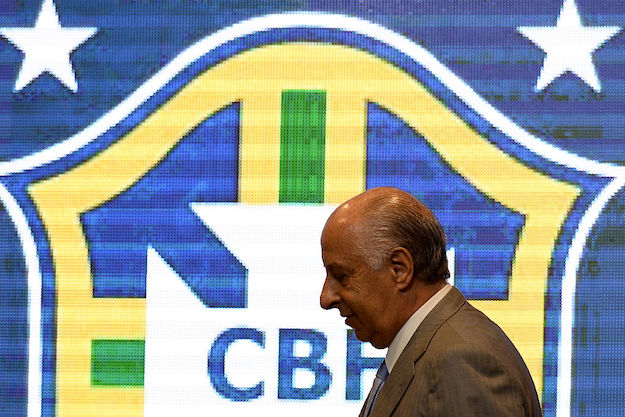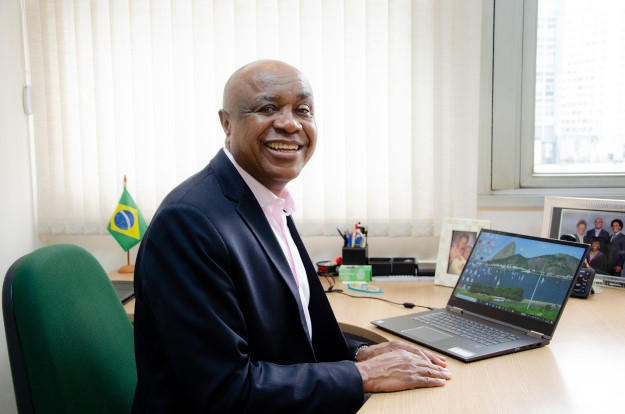SÃO PAULO – When the World Cup kicks off on June 14, the Brazilian team will be among the favorites to win – and redeem itself after a heartbreaking loss in the 2014 semi-finals. But while prospects are bright on the pitch, the nation’s favorite sport is in turmoil politically.
Even as a corruption purge has sacked politicians and business leaders in the years since the last World Cup, it would appear Brazil’s soccer governance isn’t getting the message.
Back in 2015, the FIFA-gate scandal tied Brazilian soccer circles to international corruption when José Maria Marin, then-president of Brazil’s national soccer federation, the CBF, was arrested and ultimately convicted of extortion, fraud and money laundering by a U.S. court. Both Marin and his predecessor remain under criminal investigation by Brazilian authorities. But that’s not all. FIFA recently imposed a lifetime ban on Marin’s successor, Marco Polo Del Nero, and fined him a million dollars for “schemes in which he received bribes in exchange for his role in awarding contracts to companies for the media and marketing rights to various soccer tournaments.”
Even the vice president seeing out the rest of Del Nero’s term is under investigation for corruption.
All of this might serve as a cautionary tale for Brazil’s current and future soccer leaders. But in the election to choose Del Nero’s replacement in April, there was no obvious thirst for reform or renewal.
Del Nero’s handpicked successor, Rogério Caboclo – a key ally who served as executive director of management during Del Nero’s presidency – won an uncontested ballot. At the time of the election, Del Nero had been suspended from the CBF presidency.
“In nominating and electing someone recommended by a criminal, they demonstrated how the system is closed and tends to continue with its fraudulent operations,” Romário, a star player for Brazil in the 1990s and now a senator representing the state of Rio de Janeiro, told AQ via email.
As of publication, the CBF had not responded to requests for an interview.
Last year, the CBF changed its system for electing presidents, giving more power to the 27 state soccer federations that oversee the game in each of Brazil’s administrative divisions. Every month, the CBF provides 75,000 reais (about $20,600) to each state federation for operating costs, and 20,000 reais to each state federation president for personal expenses.
The assembly that approved the new voting system was unlawful because only the federation presidents were in attendance, said Romário, who told AQ he tried to have the election annulled in the courts, but was unsuccessful. Arguing that it was made illegitimately, prosecutors asked the Rio Court of Justice to annul the voting change, but a judge denied the request. The Rio Attorney General’s Office plans to appeal the decision.
Ultimately, Caboclo was elected with votes from all 27 state federations and 37 of the 40 member clubs.
Juca Kfouri, a renowned Brazilian soccer writer, told AQ that an alternative outcome to the ballot was unlikely. “They (state federation presidents and clubs) are all flour from the same sack. They benefit from an anti-democratic, corrupt and reactionary system, and are averse to change. They are content with stealing crumbs.”
Caboclo’s supporters disagree. “He is a guy who is competent, with good ideas, and decent,” said Francisco Novelletto, the president of the Rio Grande do Sul federation, who Caboclo will bring on as a vice president when he finally takes office in April 2019. “In four years (as executive director) Caboclo took revenues of the CBF from 250 million reais to 850 million.”
Romário, who headed up a parliamentary inquiry into Brazilian soccer in 2016, said that the investigation left “no doubt that a criminal organization has operated within the CBF for many years.” Based on Romário’s findings, prosecutors launched a criminal investigation into Del Nero, Marin and other CBF executives in 2017.
“Our soccer structure is rotten,” Romário said. “While in the rest of the world, the institutions seek to renew themselves and modernize, over here we still trade favors and exchange votes for money.”
When Caboclo takes the helm of the CBF next year, the results of the World Cup – good or bad – will be in the rearview mirror. As a powerful voice within the world’s most popular sport, Caboclo will have a chance to send a message to the region and to the world by increasing transparency. Will he take it?
—
Law is a journalist based in São Paulo.







